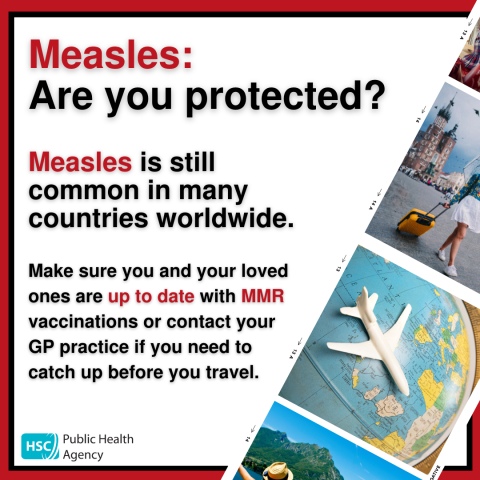Get the MMR vaccine ahead of Easter travel

The Public Health Agency (PHA) is urging all those eligible for the MMR vaccine to get vaccinated as a key part of any Easter travel plans.
With a growing number of measles cases in the UK and Europe, the PHA is currently rolling out a mass vaccination drive in collaboration with health trusts and GP surgeries for all those aged between 12 months and 25 years who missed getting one or both of their MMR (mumps, measles and rubella) vaccines first time round.
Getting both doses greatly reduces the risk of catching and spreading measles.
Louise Flanagan, Consultant in Public Health at the PHA, said: “Measles is on the rise. It is highly infectious and can easily spread between unvaccinated people. There is an increased risk when travelling to countries experiencing high numbers of measles cases. So, it is vital that you are vaccinated to help protect against this serious and sometimes deadly disease.
“If you are unsure if you or your child is up-to-date with vaccinations, the easiest way to check is to look at your child’s red book or speak to your GP practice. If you or your child has missed any vaccination, please book an appointment as soon as you can to make sure of maximum protection.”
Children between 12 months and 5 years of age can get the vaccine through their GP practice and those aged 6 years to 25 years of age can attend an HSC Trust vaccination clinic. Information on trust clinics can be found at www.nidirect.gov.uk/mmr
Measles is an acute infection caused by a virus that spreads very easily. It used to be very common in children, but following the introduction of the MMR vaccine, cases fell. Recently we have seen a decrease in the numbers of children receiving the vaccine. It is therefore important vaccination coverage is improved as soon as possible to help prevent the spread of avoidable, serious and sometimes deadly diseases such as measles.
Louise Flanagan continued: “It is important for our population to keep very high uptake levels of the MMR vaccine to help prevent the spread of infection. I would like to reassure parents that the MMR vaccine is very safe and the most effective way to prevent measles, mumps and rubella infections.
“Being unvaccinated leaves children exposed to the threat of measles, mumps and rubella, and all three of these diseases can have very serious complications.”
Although most common in children, measles can occur at any age. It is highly infectious and is caught either through direct contact with an infected person, or through the air when they cough or sneeze.
For further information see www.nidirect.gov.uk/mmr.
The initial symptoms of measles can include:
- a high temperature (fever);
- a runny or blocked nose;
- sneezing;
- a cough;
- sore, red eyes that may be sensitive to light;
- a few days later, a red-brown blotchy rash will appear. This may start on the head or upper neck, before spreading outwards to the rest of the body.
Most childhood rashes are not measles but you should consult your GP without delay if:
- you suspect it is measles;
- symptoms worsen;
- temperature increases to above 38°C;
- temperature stays high after other symptoms have gone.
Measles is very infectious so it is important that anyone with suspected measles avoids any situation where they can spread the disease, such as a GP’s waiting room or an emergency department waiting room. People should phone in advance rather than turning up to these venues.
